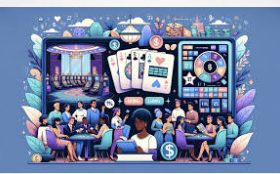At its heart, gambling is a numbers game. Behind every hand of poker, roll of the dice, or spin of the roulette wheel lies cold, hard mathematics. While casinos always have the ultimate edge over players eventually, you can use an understanding of probability and statistics to make smarter bets and gain a slight advantage at the tables at RickyCasino. In this article, we’ll explore key gambling probability principles that could help tip the odds in your favor.
The House Always Wins…Eventually
Before diving into specific tips, it’s critical to understand one fundamental truth: the house always wins. Casinos are meticulously designed money-making operations, fine-tuned to extract profits over hundreds of thousands of bets. No matter what game you play, the mathematical edge ultimately favors the house.
However, in the short term, normal variation means that players will sometimes ride lucky streaks and win big. Probability allows us to predict how often these short-term anomalies occur. While you can never overcome the ingrained house edge, you can use smart betting to take advantage of short-term positive swings.
Key Probability Principles
To understand how probability applies to gambling, you need to grasp a few key concepts:
Expected Value
This represents your average net winnings over many repetitions of a bet. A bet with positive expected value is profitable over time, while a negative expectation guarantees long-term loss.
Variance
This measures how much actual results swing above or below the expected result. High variance means more pronounced positive and negative swings. Low variance leads to more predictable outcomes clustered near the expectation.
Standard Deviation
Closely related to variance, standard deviation quantifies the typical spread of results around the mean. About 68% of outcomes will fall within one standard deviation of expected value.
Independent Events
The outcome of one bet does not impact the next. For example, red/black outcomes in roulette are independent – the ball has no “memory” between spins.
Dependent Events
Later bets are influenced by earlier results. Drawing cards from a deck is a classic example, as cards that have already been seen cannot reappear.
Armed with these critical concepts, you can start applying probability theory to actual casino games.
Probability in Action: Casino Game Analysis
While mathematical principles govern all casino games, let’s analyze roulette and blackjack specifically. Understanding the probabilistic structure of these popular games aids betting decisions.
Roulette
Roulette involves spinning a ball on a wheel with 38 numbered slots (1-36, plus 0 and 00). You can bet on individual numbers, combinations of numbers, red/black, even/odd, and more. The independent spin structure lends itself perfectly to probability calculations.
Some key roulette probabilities:
- Odds of a single number hitting: 1 in 38 (2.63%)
- Odds of red/black: Nearly 50/50
- Odds of even/odd: Nearly 50/50
- House edge: 5.26% (on standard American double-zero wheel)
While roulette odds barely fluctuate long-term, you can capitalize on short-term luck by betting more aggressively when on hot streaks. Just don’t let temporary runs fool you into thinking you can beat that 5.26% house edge!
Blackjack
Blackjack involves drawing cards with values close to 21 without going over. Since cards come from a limited 52-card deck, blackjack incorporates dependent probability because the deck composition changes as cards are dealt.
Key blackjack probabilities:
- Odds of being dealt 21 (blackjack): 4.83%
- Dealer chance of busting with 7 showing: 42.22%
- Player chance of busting with 12 vs dealer 2: 23.34%
- House edge: 0.5% (with perfect basic strategy)
As you can see, blackjack probabilities ebb and flow depending on what cards have already been dealt. Keeping a mental count of remaining high and low cards in the deck allows players to determine whether upcoming hands favor the dealer or player. This form of card counting, though frowned upon by casinos, lets skilled players flip the house edge in their favor.
Turning Probability into Profit
While a mathematical approach to gambling has its merits, probability alone won’t make you rich. True long-term profit requires applying advanced gambling concepts:
- Bankroll management
- Bet sizing based on edge
- Game selection (favorable rules/payouts)
- Discipline to play the percentages
By combining knowledge of probability with these critical gambling tenets, you can modestly bend odds in your favor. Over thousands of real-money bets, small edges compound into solid profit.
Of course, even perfect play comes with no guarantees – variance can always lead to short-term losing streaks. Probability grants the patient, disciplined player an advantage, but luck plays a role too.
Conclusion
Gambling odds are calculated down to fractions of a percentage, but those small edges drive casino profits. By taking an analytical approach, players can tilt odds slightly in their favor as well. While the house ultimately wins over millions of bets, probability and math allow strategic gamblers to maximize temporary swings in their favor.
So next time you visit the casino, leave gut feelings at home. The numbers don’t lie – combining statistical analysis with tried-and-true gambling fundamentals can lead to steady profits over the long run. The odds will always favor the house, but using them to your advantage evens the score.




















